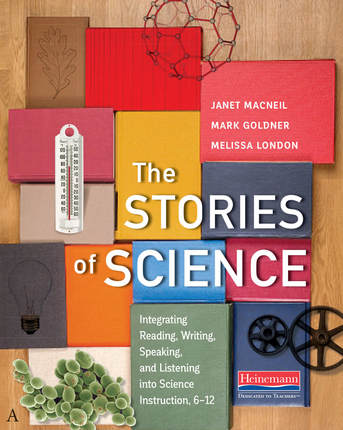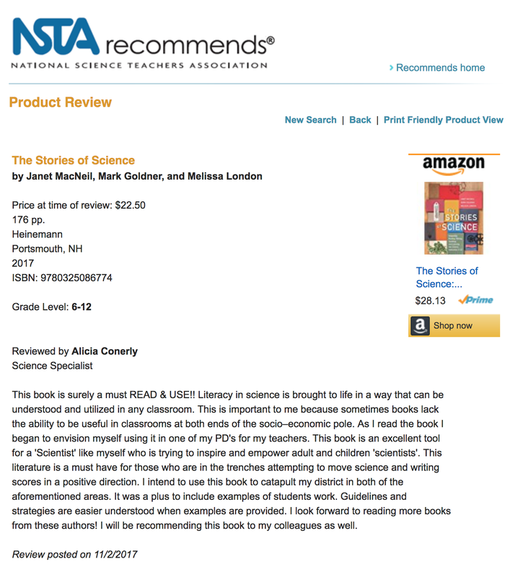
The Stories of Science illustrates how to use the power of story to strengthen science teaching and learning by weaving literacy skills into science. It includes evidence on the power of story to deepen learning, details on the essential elements of good science stories, lessons on teaching students to be effective science communicators, case studies from our classrooms (illustrated by examples of student work), how to use the concept of story/storylines to organize curriculum and much more. (Even though the target audience is 6-12, most of the content is readily applicable to upper elementary as well.)
The book focuses on teaching students to craft three types of stories:
The strategies included in the book explicitly support a wide range of NGSS Disciplinary Core Ideas and Science & Engineering Practices (such as Asking Questions, Constructing Explanations, and Obtaining, Evaluating and Communicating Information). It also will be invaluable for meeting the ELA Common Core (Writing, Reading Informational Text, and Speaking and Listening) in support of science.
Check it out on amazon.
To download a sample chapter and access companion resources, go to the Heinemann webpage.
The book focuses on teaching students to craft three types of stories:
- Explanation stories that make meaning from data and observation of phenomena.
- Informational stories that answer complex questions by synthesizing the research of others.
- Personal stories that tell about the lives of scientists, their discoveries, and how scientific thinking has changed over time.
The strategies included in the book explicitly support a wide range of NGSS Disciplinary Core Ideas and Science & Engineering Practices (such as Asking Questions, Constructing Explanations, and Obtaining, Evaluating and Communicating Information). It also will be invaluable for meeting the ELA Common Core (Writing, Reading Informational Text, and Speaking and Listening) in support of science.
Check it out on amazon.
To download a sample chapter and access companion resources, go to the Heinemann webpage.

What People are Saying About The Stories of Science:
"This book offers a new lens that increases the power of inquiry-based teaching."
--Karen Worth, science instructor at Wheelock College; coauthor of The Essentials of Science and Literacy
"The Stories of Science is an excellent resource for teachers interested in incorporating more cross-disciplinary skills into their science teaching. This book shows the power of storytelling in science, while also providing some sample lesson plans so other teachers can implement the strategies successfully. The insights from this book are powerful to teaching and learning!"
--Meaghan Cells, chemistry teacher at Brookline High School
"The Stories of Science will be a valued addition to professional libraries of teachers seeking to make their science teaching and nonfiction writing more engaging and accessible. This book offers a variety of suggested strategies, lessons, and resources to make this happen, along with stories that can make science teaching more meaningful for all involved."
--Jeff Winokur, science education instructor at Wheelock College; coauthor of The Essentials of Science and Literacy
"This book offers a new lens that increases the power of inquiry-based teaching."
--Karen Worth, science instructor at Wheelock College; coauthor of The Essentials of Science and Literacy
"The Stories of Science is an excellent resource for teachers interested in incorporating more cross-disciplinary skills into their science teaching. This book shows the power of storytelling in science, while also providing some sample lesson plans so other teachers can implement the strategies successfully. The insights from this book are powerful to teaching and learning!"
--Meaghan Cells, chemistry teacher at Brookline High School
"The Stories of Science will be a valued addition to professional libraries of teachers seeking to make their science teaching and nonfiction writing more engaging and accessible. This book offers a variety of suggested strategies, lessons, and resources to make this happen, along with stories that can make science teaching more meaningful for all involved."
--Jeff Winokur, science education instructor at Wheelock College; coauthor of The Essentials of Science and Literacy
